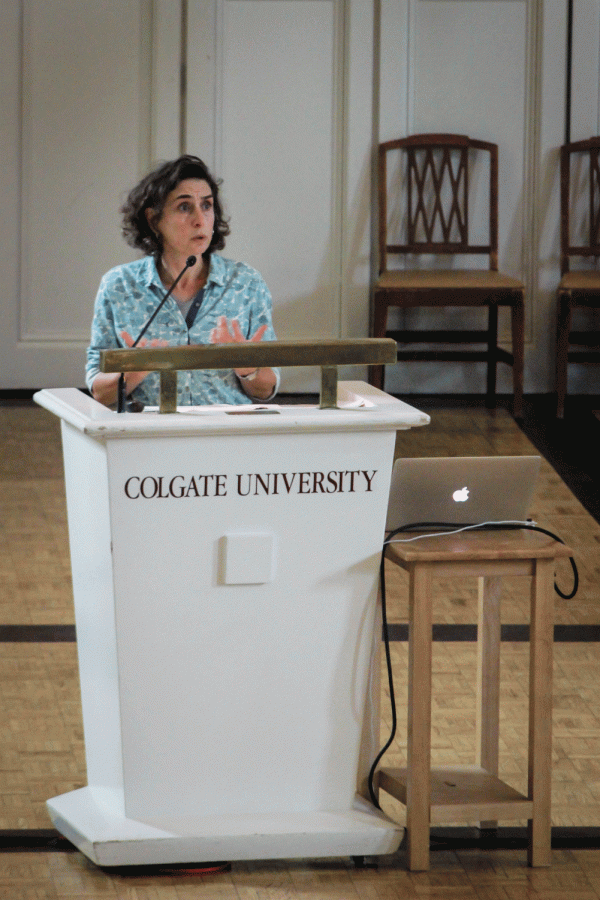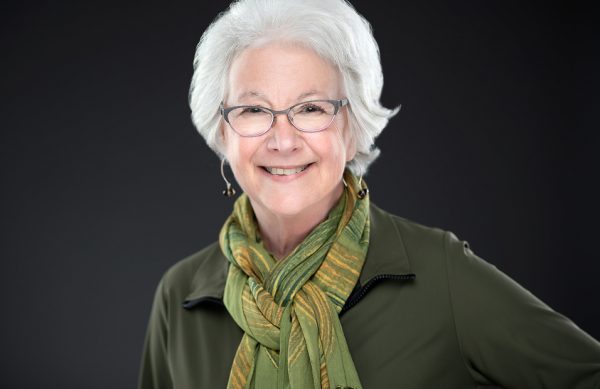Living Writers Series Kicks Off
Before facing the scary experience of moving away from home, first-years were instructed to read about the equally scary but much more fatal effects of human interaction: extinction on a mass and unprecedented scale. In her Pulitzer Prize winning novel The Sixth Extinction: An Unnatural History, author Elizabeth Kolbert tackles the detrimental effects humans have had on both fauna and flora, and argues that humans are causing the sixth mass extinction in the history of our planet. Kolbert traveled to Colgate on Thursday, September 14 to kick off this year’s Living Writers series with a talk about her book followed by a question and answer session and book signing.
Associate Professor of English Jennifer Brice, who co-coordinated the event with Associate Professor of Biology Catherine Cardelús, introduced Kolbert to the full chapel of attendees. Brice touched on why Kolbert was selected as the first Living Writers speaker and why her book was this year’s choice as the assigned reading for first-years.
“The fact that a journalist comes along who’s possessed with the energy, intelligence and curiosity … to tell a complex series of interlocking stories that all point to a singular hard-to-swallow truth, and that tens of thousands of people, including most of us in this room, have read that story not just willingly but hungrily, suggests to me that The Sixth Extinction ought to be read not as an epithet or a eulogy but perhaps as a manual for our survival,” Brice said.
“People told me they wanted to hear more about what they could do to solve the problems the book addresses: climate change, ocean acidification, invasive species and habitat destruction,” Kolbert said.
While the book lacked those solutions, her speech attempted to provide some answers. Kolbert divided her talk into three main sections, each focusing on an endangered species: the African elephant, the chestnut tree and the kakapo.
Kolbert addressed the work of Sam Wasser, Director for the Center of Conservation of Biology in Seattle, Washington, who discovered how to obtain DNA from feces. With this technology, Wasser matched DNA from elephant tusks taken in the ivory trade to discover where illegal poaching was taking place. By locating the two areas where poaching was prevalent, he put pressure on the Tanzanian government to assemble a task force that successfully took down a major ivory poacher.
After demonstrating the value in individual activism, Kolbert spoke of an equally devoted environmentalist focused on saving the chestnut tree. A Japanese fungus accidentally transported by humans to America essentially wiped out the chestnut tree, but thanks to the work of William Powell, genetically engineered chestnut trees that are resistant to the fungus now exist.
Finally, Kolbert spoke on the progress that has been made to save the beloved New Zealand kakapo, which became endangered due to the introduction of several invasive species. In an effort to save the remaining native birds, the New Zealand government enacted a national initiative titled “A Predator Free New Zealand,” which encourages children and adults alike to set traps and kill predators such as the pacific rat, hedgehogs and wild cats. Thus far, the project has been incredibly successful in eliminating unnatural predators.
“I personally really admire these projects and the people behind them,” Kolbert said before acknowledging that none of the initiatives are true “solutions” and that action is still crucial.
A book signing followed the presentation. The line, consisting of first-years and upperclassmen alike, stretched throughout the Chapel as students eagerly awaited meeting the author.
“It was really cool because we were required to read this book and it sort of brings it all together,” first-year Jacob Licker said. “To actually meet the author and hear about the work she’s been doing and then to end it all with a signed copy of the book is a pretty incredible experience.”
Kolbert is currently working on a piece for The New Yorker that tackles the idea of removing carbon from the air, but she enjoyed her time off, visiting and speaking to the Colgate community.
Contact Lauren Hutton at [email protected].
Lauren Hutton is a senior from Pembroke Pines, Florida double concentrating in Women’s Studies and English with a creative writing emphasis. She has...




